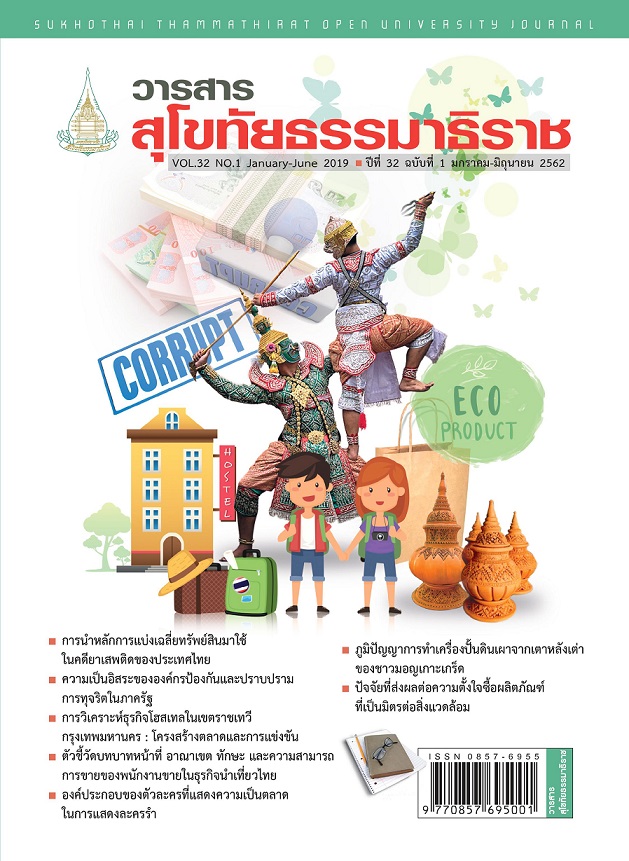ความเป็นอิสระขององค์กรป้องกันและ ปราบปรามการทุจริตในภาครัฐ
คำสำคัญ:
การทุจริต, การต่อต้านการทุจริต, ป.ป.ท., ธรรมาภิบาล, ความเป็นอิสระบทคัดย่อ
การวิจัยนี้มีวัตถุประสงค์เพื่อ 1) วิเคราะห์ถึงความเป็นอิสระในการทำงานอย่างแท้จริงของกลไกการ ดำเนินการกรณีทุจริตและประพฤติมิชอบขององค์กรป้องกันและปราบปรามการทุจริตในภาครัฐ (ป.ป.ท.) และ 2) เสนอแนวทางการส่งเสริมความเป็นอิสระในการทำงานอย่างแท้จริงของกลไกดังกล่าวข้างต้น การวิจัยนี้เป็นงานวิจัยเชิงคุณภาพซึ่งใช้วิธีการสัมภาษณ์เชิงลึกในการเก็บข้อมูล การศึกษากลไก การดำเนินการกรณีทุจริตและประพฤติมิชอบนั้น ต้องอาศัยข้อมูลเชิงลึกจากผู้มีประสบการณ์ตรง กลุ่มตัวอย่าง (ผู้เข้าร่วมการวิจัย) ของงานวิจัยนี้ได้มาโดยวิธีการเลือกแบบเจาะจง รวมทั้งสิ้น 41 คน ประกอบด้วย บุคลากร ขององค์กร ป.ป.ท. ผู้ร้องเรียน สมาชิกสภานิติบัญญัติแห่งชาติผู้มีส่วนในการร่างกฎหมายที่เกี่ยวข้องกับ องค์กร ป.ป.ท. บุคลากรขององค์กรป้องกันและปราบปรามการทุจริตแห่งชาติ (ป.ป.ช.) ตัวแทนภาคประชาชน เจ้าหน้าที่ตำรวจ ตัวแทนภาคเอกชน และนักวิชาการ ผลการวิจัยพบว่า 1) ผู้เข้าร่วมการวิจัยส่วนใหญ่มีความเห็นว่าสำนักงาน ป.ป.ท. เป็นอิสระเชิงโครงสร้าง เพื่อเป็นหลักประกันความเป็นอิสระในการทำงานอย่างแท้จริงของกลไกการดำเนินการกรณีทุจริตและประพฤติ มิชอบ และ 2) เสนอให้มีการแก้ไข พระราชบัญญัติมาตรการของฝ่ายบริหารในการป้องกันและปราบปราม การทุจริต เพื่อเปิดให้มีการปฏิรูปโครงสร้างองค์กร ป.ป.ท. เพื่อให้สำนักงาน ป.ป.ท. พ้นจากการควบคุมของ รัฐบาล
เอกสารอ้างอิง
Braun, V., & Clarke, V. (2006). Using Thematic Analysis in Psychology. Qualitative Research in Psychology, 3(2), 77-101.
Choi, J.-W. (2009). Institutional Structures and Effectiveness of Anticorruption Agencies: A Comparative Analysis of South Korea and Hong Kong. Asian Journal of Political Science, 17(2), 195-214.
De Sousa, L. (2010). Anti-corruption Agencies: Between Empowerment and Irrelevance Crime, Law and Social Change, 53(1), 5-22.
Denscombe, M. (2010). The Good Research Guide: For Small-Scale Social Research Projects: For Small-Scale Social Research Projects. Berkshire: Open University Press.
Doig, A. (1995). Good Government and Sustainable Anti-Corruption Strategies: A Role for Independent Anti-Corruption Agencies. Public Administration and Development, 15(2), 151-165.
Doig, A., Watt, D., & Williams, R. (2007). Why do Developing Country Anti-Corruption Commissions Fail to Deal with Corruption? Understanding the Three Dilemmas of Organisational Development, Performance Expectation, and Donor and Government Cycles. Public
Administration and Development, 27(3), 251-259.
Gregory, R. (2015). Political Independence, Operational Impartiality, and the Effectiveness of Anti-Corruption Agencies. Asian Education and Development Studies, 4(1), 125-142.
Krajewska, A., & Makowski, G. (2017). Corruption, Anti-Corruption and Human Rights: The Case of Poland’s Integrity System. Crime, Law and Social Change, 68(3), 325-339.
Mao, Y., Wong, C.-S., & Peng, K.Z. (2013). Breaking Institutionalized Corruption: Is the Experience of the Hong Kong Independent Commission Against Corruption Generalizable. Asia Pacific Journal of Management, 30(4), 1115-1124.
Meagher, P. (2005). Anti-Corruption Agencies: Rhetoric Versus Reality. The Journal of Policy Reform, 8(1), 69-103.
Montinola, R.G. (2004). Corruption, Distrust, and the Deterioration of the Rule of Law. In H. Russell (Ed.), Distrust (pp. 298-324). New York: Russell Sage Foundation.
Miller, T., Birch, M., Mauthner, M., & Jessop, J. (2012). Ethics in Qualitative Research. London: SAGE Publications.
National Reform Steering Assembly. (2015 [B.E.2558]). The Prevention and Suppression of Corruption and Malfeasance. Bangkok: The Secretariat of the House of Representatives. [in Thai]
Prateeppornnarong, D., & Young, R. (2017). A Critique of the Internal Complaints System of the Thai Police. Policing and Society, 1-18.
Quah, J.S.T. (2010). Defying Institutional Failure: Learning from the Experiences of Anti-Corruption Agencies in Four Asian countries. Crime, Law and Social Change, 53(1), 23-54.
Quah, J.S.T. (2015). Singapore’s Corrupt Practices Investigation. Asian Education and Development Studies, 4(1), 76-100.
Rose-Ackerman, S. (1999). Corruption and Government: Causes, Consequences, and Reform. New York: Cambridge University Press.
Sampson, S. (2010). The Anti-Corruption Industry: From Movement to Institution. Global Crime, 11(2), 261-278.
Skidmore, J. (1996). Promise and Peril in Combating Corruption: Hong Kong’s ICAC. The Annals of the American Academy of Political and Social Science, 547, 118-130.
Tomic, S. (2018). Legal Independence vs. Leaders’ Reputation: Exploring Drivers of Ethics Commissions’ Conduct in New Democracies. Public Administration, 96(3), 544-560.
Uwanno, B. (1995). Impeachment. Bangkok: TRF.
Welsh, F. (1993). A History of Hong Kong. London: Harper Collins.
Laws cited
Constitution of the Kingdom of Thailand, B.E.2560 [in Thai]
Organic Act on Prevention and Suppression of Corruption, B.E.2561 [in Thai]
ดาวน์โหลด
เผยแพร่แล้ว
รูปแบบการอ้างอิง
ฉบับ
ประเภทบทความ
สัญญาอนุญาต
บทความที่ได้รับการตีพิมพ์เป็นลิขสิทธิ์ของวารสารมหาวิทยาลัยสุโขทัยธรรมาธิราช
ข้อความที่ปรากฏในบทความแต่ละเรื่องในวารสารวิชาการเล่มนี้เป็นความคิดเห็นส่วนตัวของผู้เขียนแต่ละท่านไม่เกี่ยวข้องกับมหาวิทยาลัยสุโขทัยธรรมาธิราช และคณาจารย์ท่านอื่นๆในมหาวิทยาลัยฯ แต่อย่างใด ความรับผิดชอบองค์ประกอบทั้งหมดของบทความแต่ละเรื่องเป็นของผู้เขียนแต่ละท่าน หากมีความผิดพลาดใดๆ ผู้เขียนแต่ละท่านจะรับผิดชอบบทความของตนเองแต่ผู้เดียว
ห้ามนำข้อความทั้งหมด หรือบางส่วนไปพิมพ์ซ้ำ เว้นแต่จะได้รับอนุญาตจากกองบรรณาธิการวารสาร



